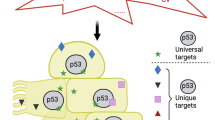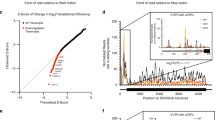Abstract
Activation of the p53 tumour suppressor protein can lead to cell-cycle arrest or apoptosis1. p53 function is controlled by the mdm2 oncogene product, which targets p53 for proteasomal degradation2,3. In this report we demonstrate that Mdm2 induces translation of the p53 mRNA from two alternative initiation sites, giving full-length p53 and another protein with a relative molecular mass (Mr) of approximately 47K; we designate this protein as p53/47. This translation induction requires Mdm2 to interact directly with the nascent p53 polypeptide. The alternatively translated p53/47 does not contain the Mdm2-binding site and it lacks the most amino-terminal transcriptional-activation domain of p53. Increased expression of p53/47 stabilizes p53 in the presence of Mdm2, and alters the expression levels of p53-induced gene products. These results show how the interaction of Mdm2 with p53 leads to a change in the ratio of full-length p53 to p53/47 by inducing translation of both p53 proteins and the subsequent selective degradation of full-length p53. Thus, Mdm2 controls the expression levels of p53 through a dual mechanism that involves induction of synthesis and targeting for degradation.
This is a preview of subscription content, access via your institution
Access options
Subscribe to this journal
Receive 12 print issues and online access
$209.00 per year
only $17.42 per issue
Buy this article
- Purchase on Springer Link
- Instant access to full article PDF
Prices may be subject to local taxes which are calculated during checkout



Similar content being viewed by others
Change history
06 November 2003
Author Chalres W Stephen added
Notes
Footnote: The authorship of this paper has been updated to read: Yin, Y., Stephen, C. W., Luciani, M. G. & Fahraeus, R., with C. W. Stephen and Y. Yin having made equal contribution to this work.
References
Vogelstein, B., Lane, D. & Levine, A. Nature 408, 307–310 (2000).
Kubbutat, H., Jones, S. & Vousden K. Nature 387, 299–303 (1997).
Haupt, Y., Maya, R., Kazaz, A. & Oren, M. Nature 387, 296–299 (1997).
Honda, R., Tanaka, H. & Yasuda, H. FEBS Lett. 429, 25–27. (1997).
Ryan, K., Phillips, A. & Vousden, K. Curr. Opin. Cell. Biol. 13, 333–337 (2001).
Oliner, J., Pietenpol, J., Thiagaingam, S., Gyuris, J., Kinzler. & Vogelstein, B. Nature 362, 857–860 (1993).
Momand, J. Wu, H.-H. & Dasgupa, G. Gene 242, 15–29 (2000).
Kubbutat, M. & Vousden, K. Mol. Cell. Biol. 17, 460–468 (1997).
Liu, X. L., Band, H., Gao, Q., Wazer, D. E. & Band, V. Carcinogenesis 15, 1969–1973 (1994).
Gannon, J. & Lane, D. P. Nature 349, 802–806 (1991).
Kussie, P., Gorina, S., Marechal, V., Elenbaas, B., Moreau, J., Levine, A. & Pavletish, N. Science 274, 948–953 (1996).
Böttger, A., Böttger, V., Sparks, A., Liu, W.-L., Howard, S. & Lane D. Curr. Biol. 7, 860–869 (1997).
Fu, L., Minden, M. & Benchimol, S. EMBO. J. 15, 4392–4401 (1996).
Sherr, C. & Weber, J. Curr. Opin. Genet. Dev. 10, 94–99 (2000).
Pomerantz, J. et al. Cell 92, 713–723 (1998).
Elenbaas, B., Doobelstein, M., Roth, J., Shenk, T. & Levine, A. Mol. Med. 2, 439–451 (1996).
Marechal, V., Elenbaas, B., Piette, J., Nicolas, J-C, & Levine, A. Mol. Cell. Biol. 14, 7414–7420 (1994).
Mosner, J., Mummenbrauer, T., Bauer, C., Sczakiel, G., Grosse, F & Deppert, W. EMBO J. 14, 4442–4449 (1995).
Fontoura, B., Atienza, C., Sorokina, E., Morimoto, T. & Carroll, R. Mol. Biol. Cell. 17, 3146–3154 (1997).
Kubbutat, M.H., Ludwig, R.L., Levine, A.J., Vousden, K.H. Cell Growth Differ. 10, 87–92 (1999).
Venot, C., Maratrat, M., Sierra, V., Conseiller, E. & Debussche, L. Oncogene 18, 2405–2410 (1999).
Zhu, J., Zhou, W., Jiang, J. & Chen, X. J. Biol. Chem. 273, 13030–13036 (1998).
Midgley, C. A. & Lane, D. P. Oncogene 10,1179–1189 (1997).
Maya, R. et al. Genes Dev. 15, 1067–1077 (2001).
Acknowledgements
R.F. is a Cancer Research UK Senior Cancer Research Fellow. This work was supported by Cancer Research UK.
Author information
Authors and Affiliations
Corresponding author
Ethics declarations
Competing interests
The authors declare no competing financial interests.
Rights and permissions
About this article
Cite this article
Yin, Y., Stephen, C., Luciani, M. et al. p53 stability and activity is regulated by Mdm2-mediated induction of alternative p53 translation products. Nat Cell Biol 4, 462–467 (2002). https://doi.org/10.1038/ncb801
Received:
Revised:
Accepted:
Published:
Issue Date:
DOI: https://doi.org/10.1038/ncb801
This article is cited by
-
The p53 endoplasmic reticulum stress-response pathway evolved in humans but not in mice via PERK-regulated p53 mRNA structures
Cell Death & Differentiation (2023)
-
Defects in Bone and Bone Marrow in Inherited Anemias: the Chicken or the Egg
Current Osteoporosis Reports (2023)
-
Pharmaco-proteogenomic profiling of pediatric diffuse midline glioma to inform future treatment strategies
Oncogene (2022)
-
Advances in the Immunotherapeutic Potential of Isocitrate Dehydrogenase Mutations in Glioma
Neuroscience Bulletin (2022)
-
Genomic profiling identifies distinct genetic subtypes in extra-nodal natural killer/T-cell lymphoma
Leukemia (2022)



